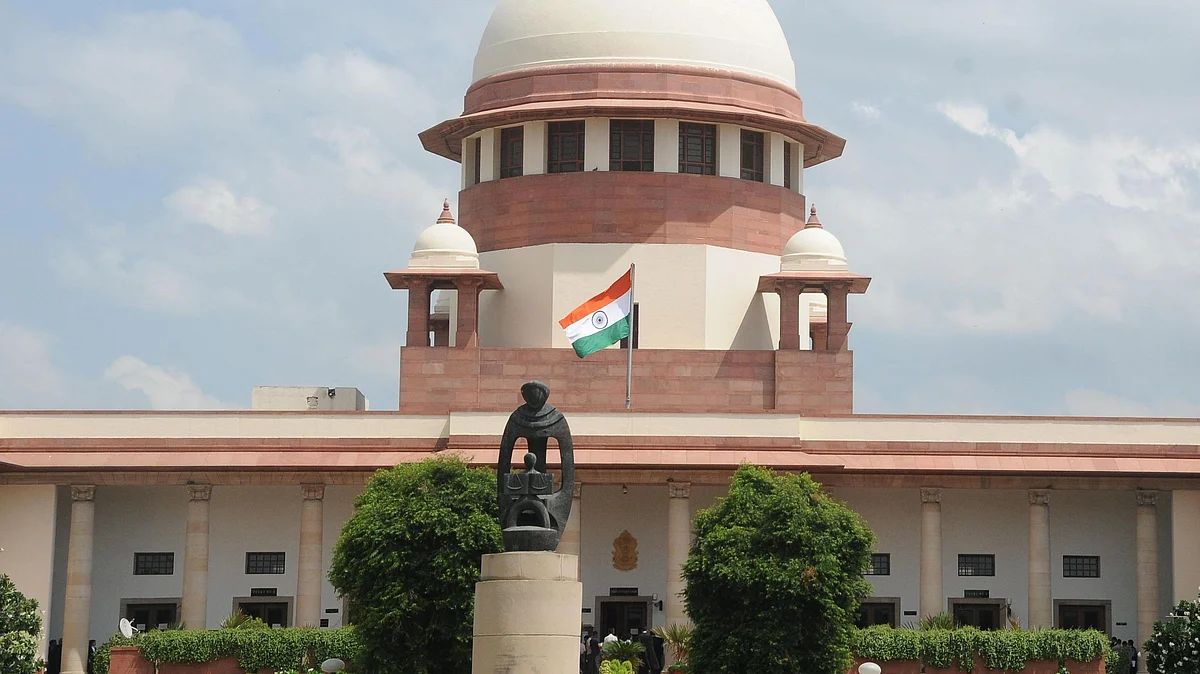CAA discriminatory as Tamil refugees in Sri Lanka excluded: DMK in SC
An affidavit filed by the DMK in SC says the CAA gives undue advantage to illegal migrants while failing to achieve its real objective, which is to support those persecuted on the basis of religion

The ruling Dravida Munnetra Kazhagam (DMK) in Tamil Nadu has told the Supreme Court that the Citizenship Amendment Act (CAA), 2019 attacks the basic fabric of secularism by discriminating on the basis of religion, while also being against the Tamil race as it does not bring Tamil refugees within the ambit of the law.
In an additional affidavit filed before the Supreme Court, the DMK submitted that CAA is discriminatory as it excludes Tamil refugees from Sri Lanka.
Filed by DMK's organising secretary RS Bharathi, the affidavit states that the CAA is arbitrary as it is applicable to only three countries – Pakistan, Afghanistan and Bangladesh.
Further, only people from six religions – Hinduism, Sikhism, Buddhism, Jainism, Parsi and Christianity – are included, while expressly excluding those following Islam.
There are close to 200 petitioners who have challenged the Act and the lead petition filed by the Indian Union Muslim League (IUML) and others state that while they do not oppose the grant of citizenship to migrants, they are aggrieved by the discrimination and illegal classification based on religion.
A bench comprising former Chief Justice Uday Umesh Lalit and Justices S Ravindra Bhat and Bela M Trivedi began to hear as many as 232 petitions, mostly PILs, on October 31, 2022.
The other petitioners include politicians such as Jairam Ramesh, Ramesh Chennithala, Asaduddin Owaisi, and Mahua Moitra, and political groups such as the Assam Pradesh Congress Committee, the Asom Gana Parishad and DMK.
The Citizenship Amendment Act, 2019, seeks to amend the definition of illegal immigrant for Hindu, Sikh, Parsi, Buddhist and Christian immigrants from Pakistan, Afghanistan and Bangladesh, who have lived in India without documentation. They will be granted Indian citizenship in six years.
Until now, the standard eligibility requirement for naturalisation has been 12 years of residence.
The Act was passed on December 12, 2019, and was notified on January 10, 2020.
The DMK’s affidavit stated, “As per the statements of objects and reasons of the impugned Act, the basis for inclusion of Pakistan, Afghanistan and Bangladesh was that their constitutions provided for a specific state religion due to which the religious minorities faced persecution on ground of religion. The situation in Sri Lanka is akin to the one in the above mentioned three countries as the Indian Tamils faced religious persecution as they were predominantly Hindus.”
The Centre remained silent to the plight of the Tamil refugees, pointed out the DMK affidavit.
“The step-motherly behaviour of the Centre towards Tamil refugees has left them living in a constant fear of deportation and an uncertain future," it said.
“I further submit that the impugned Act ignores the reality for several decades that Tamil refugees who have settled in Tamil Nadu are deprived with fundamental rights and other rights due to non-citizenship and non-naturalisation and the impugned Act does not provide any reasons to exclude them,” it added.
“Being Stateless, they have been denied of employment in the government services or in organised private sectors, the right to hold property, right to vote, enjoyment of government benefits received by the citizens and others despite there being an agreement for the same,” it added.
It said that the reasons for their fleeing from Sri Lanka have not changed as many displaced persons escaped their country due to the large-scale violence and unsafe circumstances and came to India hoping for a better future.
The CAA, the affidavit says, gives undue advantage and benefits to illegal migrants, while failing to achieve the real objective of the Act, which is to support persons persecuted on the grounds of religion.
Additionally, it says, the classification is being made applicable only to Pakistan, Afghanistan and Bangladesh having no rational nexus with policy; despite clause (9) of the Sri Lankan Constitution itself gives importance to Buddhism all over other religions.
The affidavit states that the tension between Sinhalese and Tamil population in Sri Lanka has historical roots. There are two separate Tamil communities in Sri Lanka - Sri Lankan Tamils and Indian Tamils, though they both are of the same ethnic origin and speak the same language, the Indian Tamils were introduced to Ceylon from South India by a British as bonded labour.
To resolve the citizenship issues faced by 9,75,000 Indian Tamils residing in Sri Lanka, in 1964, the affidavit notes that an agreement was entered into by the Indian government and Sri Lankan government on the status and future of persons of Indian origin in Ceylon by an exchange of letters also called as ‘Shirimavo-Shastri Pact’. Signed in 1964, pact talks about granting of Ceylonese citizenship to 3,00,000 of the Indian population in Sri Lanka, while 5,25,000 would be repatriated to India and the citizenship of the remaining 1.5 lakh Indian residents of Ceylon would be negotiated later.
DMK underscored that the union government's counter affidavit dated October 30, 2022, has remained silent to the plight of Tamil refugees.
Follow us on: Facebook, Twitter, Google News, Instagram
Join our official telegram channel (@nationalherald) and stay updated with the latest headlines
